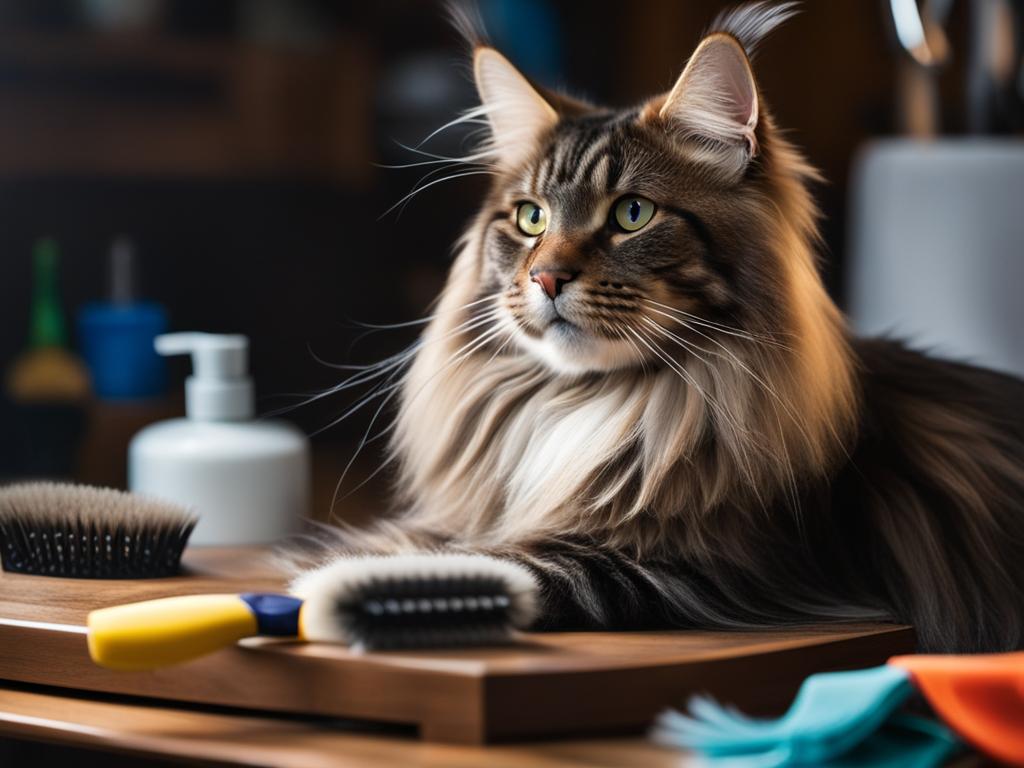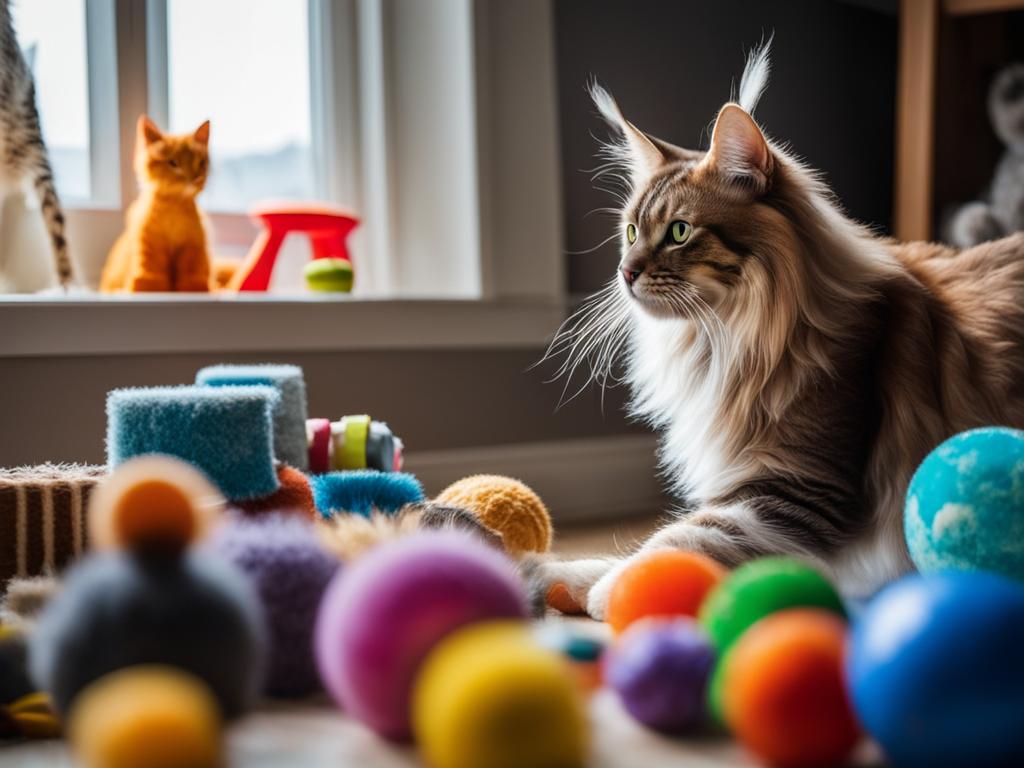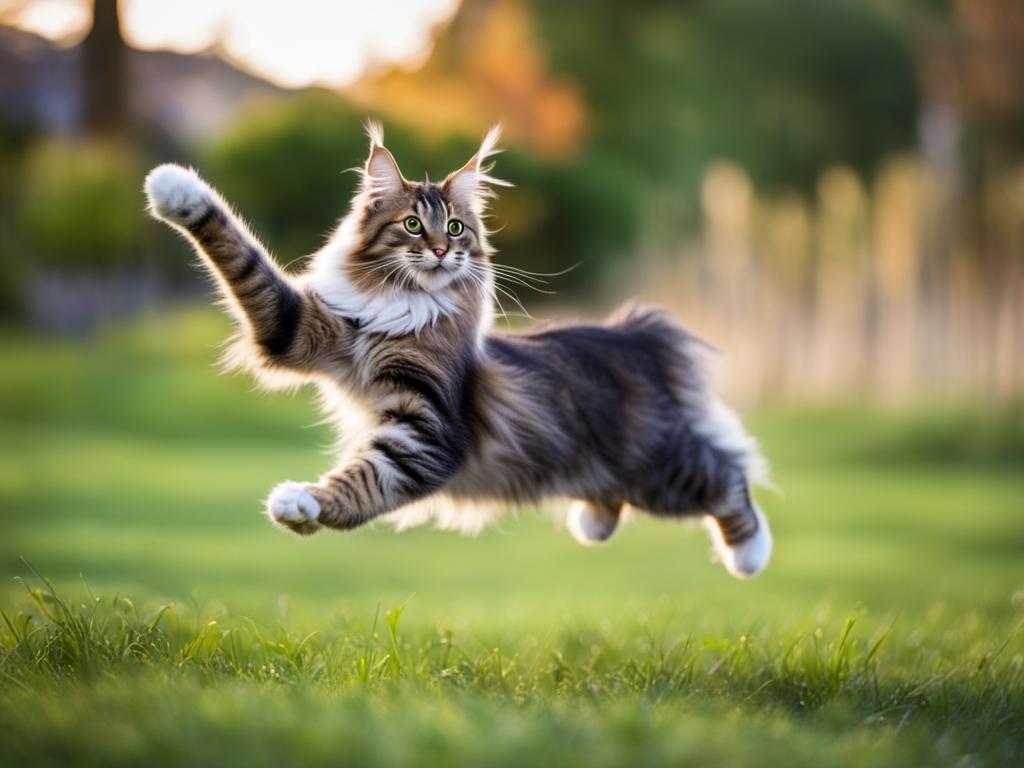Maine Coon cats are known for their sociable nature and playful behavior. As a responsible owner, it’s essential to provide them with the physical activity they need to stay active and healthy. Regular exercise not only helps prevent obesity but also stimulates their mind and promotes overall well-being. In this article, we will explore the exercise needs of Maine Coon cats and ways to incorporate physical activities into their daily routine.
Key Takeaways:
- Maine Coon cats are sociable and playful, requiring regular physical activity to stay healthy.
- Exercise helps prevent obesity, stimulates their mind, and promotes overall well-being.
- By understanding their exercise needs, you can incorporate fun activities into their daily routine.
- Regular exercise not only keeps them physically fit but also satisfies their natural instincts.
- Promoting an active lifestyle for Maine Coons contributes to their long-term health and happiness.
Understanding Maine Coon Care Basics
Maine Coon cats are beloved for their unique characteristics and charming personalities. While they are generally low-maintenance, it is important to provide them with proper care and attention to ensure their health and wellbeing. This section will delve into key aspects of Maine Coon care, including grooming, outdoor activities, social behavior, training, and overall health.
Grooming Your Maine Coon
Maine Coons have long, thick fur that requires regular grooming to keep it in optimal condition. Their double coat is designed to protect them from harsh weather, but it can also trap dirt, tangles, and mats. To maintain a healthy coat, it is recommended to brush your Maine Coon at least once a week using a wide-toothed comb or a brush specifically designed for long-haired cats. Regular grooming not only helps prevent mats and hairballs but also promotes bonding between you and your furry companion.
https://www.youtube.com/watch?v=aq0e9VxCPyk
Engaging in Outdoor Activities
Maine Coons have a natural affinity for the great outdoors. Their adventurous spirit and strong hunting instincts make them excellent candidates for supervised outdoor activities. It is important to provide them with opportunities for fresh air and exercise in a safe and controlled environment. Whether it’s a secure outdoor enclosure or leash training for supervised walks, allowing your Maine Coon to explore the outside world can greatly enrich their lives.
Social Behavior with Strangers
Maine Coons are known for their friendly and sociable nature. They generally enjoy the company of humans and may actively seek attention from strangers. However, it is important to understand that each Maine Coon has its unique personality, and some may be more reserved or cautious around unfamiliar people. Early socialization and gradual exposure to different people and situations can help foster positive interactions and ensure that your Maine Coon feels comfortable and safe in various environments.
Training and Mental Stimulation
While Maine Coons are intelligent cats, they can also be quite independent. However, training provides an excellent opportunity for mental stimulation and strengthening the bond between you and your feline companion. Consider incorporating reward-based training techniques into their daily routines, using treats and positive reinforcement to encourage desired behaviors. Interactive toys and puzzle feeders can also keep their minds engaged and prevent boredom.
Maintaining Overall Health
Maine Coons are generally healthy cats, but like any other breed, they may be prone to certain health issues. Regular veterinary check-ups, vaccinations, and preventive care are essential to detect and address any underlying conditions. Additionally, proper nutrition, weight management, and dental care play crucial roles in ensuring the overall health and longevity of your Maine Coon.
Meeting the Outdoor Exercise Needs of Maine Coon Cats
Maine Coon cats are famous for their love of the outdoors and their strong hunting instincts. Providing them with opportunities for outdoor exercise is crucial for their mental and physical well-being.
Engaging in outdoor activities with your Maine Coon can help satisfy their natural instincts and provide them with important physical and mental stimulation. It allows them to explore their surroundings, which is essential for their overall happiness and satisfaction.
Exercise is not only a great way to keep your Maine Coon active and healthy, but it also helps to prevent obesity, which is a common concern for many cat owners. Regular outdoor exercise can help your Maine Coon maintain a healthy weight and reduce the risk of weight-related health issues.
When planning outdoor activities for your Maine Coon, consider the following:
- Choose a safe and secure area: Ensure that the outdoor environment is free from potential dangers such as busy roads or toxic plants. Create a secure outdoor space with fences or enclosures to prevent your Maine Coon from wandering off or encountering hazards.
- Supervise outdoor time: It’s important to keep a watchful eye on your Maine Coon while they are outside. This allows you to monitor their behavior, protect them from potential dangers, and ensure they do not engage in any harmful activities.
- Enrichment activities: Provide your Maine Coon with interactive toys or puzzle feeders to stimulate their mind and keep them engaged during outdoor playtime. These activities can mimic hunting experiences and provide mental stimulation.
- Regular check-ups: Schedule regular veterinary check-ups to ensure your Maine Coon remains in good health. Your veterinarian can provide important vaccinations and check for any underlying health conditions that may affect their outdoor activities.
While outdoor exercise is beneficial for Maine Coon cats, it’s important to be aware of the potential risks. Maine Coons may catch prey while outside, which they may bring home or consume. This can pose risks such as potential allergies or upset stomachs from eating something harmful. Being vigilant and maintaining a safe outdoor environment can help minimize these risks.

Grooming Your Maine Coon for Optimal Health
Maine Coon cats are known for their stunning, long-haired coats. To keep your Maine Coon’s coat healthy and shiny, regular grooming is essential. Not only does grooming reduce shedding and prevent hairballs, but it also allows you to check for any skin issues or abnormalities that may require veterinary attention.
The first step in grooming your Maine Coon is to invest in high-quality grooming tools. A slicker brush with both long and short bristles is perfect for removing loose hair and preventing matting. Additionally, a wide-toothed comb can be used to untangle any knots or mats gently.
Start by gently brushing your Maine Coon’s coat every few days. Pay extra attention to the areas prone to matting, such as the belly and behind the ears. Regular brushing not only helps to keep your cat’s coat looking beautiful but also reduces shedding by removing loose hair before it can spread throughout your home.
In addition to regular brushing, it is important to establish a routine for other grooming tasks. This includes trimming your Maine Coon’s nails regularly to prevent overgrowth and provide him with comfortable walking. Additionally, check your cat’s ears for any signs of infection and clean them with a veterinarian-approved ear cleaner if necessary.
Reducing Shedding in Maine Coons
Maine Coons have a double-layered coat that naturally sheds to some extent. Regular grooming can significantly reduce shedding by removing dead hair and preventing it from accumulating. By incorporating brushing into your Maine Coon’s grooming routine, you can keep shedding under control and maintain a cleaner home environment.
Avoid shaving your Maine Coon’s coat as it can disrupt the natural shedding cycle and cause more hair to be released simultaneously. Instead, focus on using proper grooming techniques and keeping your cat’s coat healthy through a balanced diet and regular exercise.
Preventing Hairballs in Maine Coon Cats
Due to their long fur and thorough self-grooming habits, Maine Coon cats are prone to hairballs. Hairballs occur when cats swallow enough fur during grooming that it forms a hairball in their stomach. Although occasional hairballs are normal, excessive hairball formation can be a sign of an underlying issue.
To help prevent hairballs, incorporate a hairball control diet into your Maine Coon’s feeding routine. These diets usually contain specialized fibers that help move the fur through the digestive system, reducing the likelihood of hairball formation. Additionally, regular grooming and brushing help to remove loose hair, preventing it from being ingested during self-grooming.
| Grooming Tips for Maine Coons | |
|---|---|
| Brush your Maine Coon’s coat every few days to reduce shedding and prevent matting. |  |
| Invest in high-quality grooming tools such as a slicker brush and wide-toothed comb. | |
| Trim your Maine Coon’s nails regularly to prevent overgrowth. | |
| Check your cat’s ears for any signs of infection and clean them with a veterinarian-approved ear cleaner. | |
| Incorporate a hairball control diet into your Maine Coon’s feeding routine to prevent hairball formation. |
Training and Mental Stimulation for Maine Coon Cats
Maine Coon cats are highly intelligent and thrive on mental stimulation. Engaging them in regular playtime and training sessions not only keeps them mentally sharp but also provides them with the physical activity they need. Here are some tips to keep your Maine Coon mentally stimulated and entertained:
Interactive Toys
Interactive toys are a great way to provide mental stimulation for Maine Coon cats. These toys encourage problem-solving and keep your cat engaged for hours. Look for toys that mimic hunting or puzzle toys that dispense treats as rewards. Interactive toys can help satisfy their natural instincts and prevent boredom.
Training Sessions
Maine Coons are highly trainable, and teaching them new tricks can be a fun and rewarding experience. Start with basic commands such as sit, stay, or paw, and gradually introduce more complex tasks. Use positive reinforcement techniques, such as treats or praises, to encourage good behavior. Training sessions not only provide mental stimulation but also strengthen the bond between you and your cat.
Playtime
Playtime is essential for Maine Coons to burn off energy and keep them physically active. Use interactive toys, such as feather wands or laser pointers, to engage your cat in chase and pounce games. Set aside dedicated playtime every day to ensure your Maine Coon gets the exercise they need.
Enrichment Activities
Incorporate enrichment activities into your Maine Coon’s daily routine to keep them mentally engaged. Hide treats around the house for them to find, create puzzle feeders that require problem-solving to access food, or build a cat tree where they can climb and explore. These activities provide mental stimulation and prevent boredom.
By incorporating interactive toys, training sessions, playtime, and enrichment activities into your Maine Coon’s routine, you can keep them mentally stimulated and physically active, promoting their overall well-being and happiness.

| Benefits of Mental Stimulation for Maine Coons | Ways to Provide Mental Stimulation |
|---|---|
|
|
Maintaining the Health of Your Maine Coon
Maine Coon cats are generally healthy and resilient, but it’s important to be aware of the common health issues that they may be prone to. By understanding these potential health concerns and taking proactive measures, you can help ensure that your Maine Coon remains in optimal health.
Common Health Issues in Maine Coons
While Maine Coons are generally healthy, there are a few common health issues that owners should be aware of. Two significant conditions that can affect Maine Coons are hip dysplasia and hypertrophic cardiomyopathy. Hip dysplasia is a hereditary condition that affects the hip joints and can lead to pain and mobility issues. Hypertrophic cardiomyopathy is a genetic heart disease that causes the heart muscles to thicken, potentially leading to heart failure.
To ensure the well-being of your Maine Coon, it’s essential to be vigilant and watch for any signs or symptoms of these health issues. Regular veterinary check-ups are crucial for early detection and treatment. Your veterinarian may recommend diagnostic tests and preventive measures based on your cat’s individual needs.
Weight Management in Maine Coons
Weight management is another vital aspect of Maine Coon health. These cats have a large and robust build, making them more prone to obesity. Obesity can lead to various health problems, including joint issues, diabetes, and heart disease. It’s crucial to provide your Maine Coon with a balanced and portion-controlled diet, tailored to their individual needs.
Consult with your veterinarian for guidance on maintaining your cat’s ideal weight. They can provide recommendations on suitable feeding strategies, portion sizes, and proper nutrition to keep your Maine Coon at a healthy weight. Regular exercise and playtime also play a significant role in weight management for Maine Coon cats.
Providing a Nutritious Diet for Your Maine Coon
Maine Coons are large and active cats that require a nutrient-rich diet to support their overall health and well-being. When it comes to their nutrition, it’s crucial to focus on feeding them high-quality cat food that is specifically formulated for their unique needs.
One of the key components of a Maine Coon’s diet is animal protein. These majestic felines are natural carnivores, and a diet rich in animal protein is essential for their muscle development and energy levels. Look for cat foods that list meat or fish as the main ingredient to ensure your Maine Coon receives the necessary protein for optimal growth.
In addition to high-quality protein, it’s important to avoid cat foods that contain potential allergens or unnecessary fillers. Maine Coons, like any other breed, can have food allergies or sensitivities. By reading labels carefully and choosing cat food that is free from common allergens such as grains, soy, or artificial additives, you can minimize the risk of digestive issues and provide a well-balanced diet.
When it comes to feeding a Maine Coon, consider their size and energy levels. These cats are known for their hearty appetites, so it’s important to provide them with controlled portions to prevent overeating and weight gain. Consult with your veterinarian to determine the appropriate feeding schedule and quantity based on your Maine Coon’s age, weight, and activity level.
FAQ
What are the exercise needs of a Maine Coon cat?
Maine Coon cats have a high energy level and require regular physical activity to stay healthy and happy. They should engage in play and exercise for at least 20-30 minutes per day.
How can I keep my Maine Coon cat active?
You can keep your Maine Coon cat active by providing them with toys and activities that stimulate their hunting instincts, such as interactive puzzle toys, feather wands, and laser pointers. Additionally, you can set up obstacle courses or provide climbing trees and scratching posts for them to explore and play.
What are some outdoor activities I can do with my Maine Coon cat?
Maine Coons enjoy exploring the outdoors, but it’s important to do so safely. You can harness train your cat and take them for supervised walks or create an enclosed outdoor space where they can play and enjoy fresh air. Just ensure the area is secure and free from potential hazards.
How often should I groom my Maine Coon cat?
Maine Coon cats have long, thick fur that requires regular brushing. Aim to brush their coat every few days to prevent matting and reduce shedding. Regular grooming also allows you to check their skin for any issues and helps prevent the formation of hairballs.
Can I train my Maine Coon cat?
Yes, Maine Coons are highly intelligent and can be trained to perform various tasks and tricks. Positive reinforcement methods, such as treats and praise, work well with Maine Coons. You can teach them simple commands and engage in interactive play to keep their minds sharp and active.
What are the common health issues in Maine Coon cats?
Maine Coons may be prone to certain health issues, including hip dysplasia (a condition affecting the hip joints) and hypertrophic cardiomyopathy (a heart disease). It’s important to monitor their weight and overall health, and schedule regular veterinary check-ups to detect any potential issues early.
What should I feed my Maine Coon cat?
Maine Coon cats require a nutritious diet that is high in animal protein. Look for cat foods that list meat or fish as the main ingredient. Avoid cat foods that contain allergens or unnecessary fillers. It’s important to provide a balanced diet and follow the feeding guidelines recommended by your veterinarian.

Leave a Reply